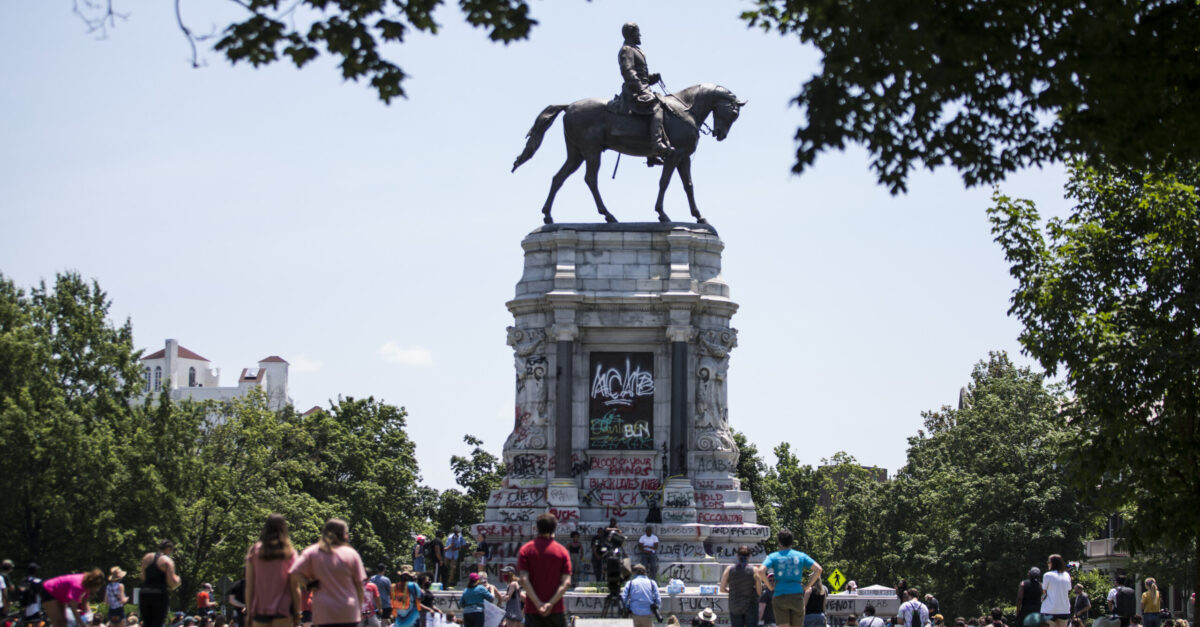
Roughly a year after Virginia Gov. Ralph Northam (D) announced plans to remove a 131-year-old Robert E. Lee statue from Richmond, the commonwealth’s highest court heard the last-ditch appeals challenging its removal.
The Democratic governor first announced his plan to remove the statue days after the murder of George Floyd inspired a national reckoning over symbols of white supremacy. A flurry of legal challenges followed: A Virginia man named William F. Davis sued without an attorney in federal court in June, in a case that was promptly dismissed in July for lack of standing. Other litigants turned to state court with lawyers and claimed to have personal stakes in the issue.
On Tuesday, a man claiming to be a descendant of the signatories to a 1890 deed transferring the statue, pedestal and land to the commonwealth reached what may be the last stop of his legal challenge: the Virginia Supreme Court, where arguments were brief.
Virginia’s solicitor general Toby J. Heytens spoke for less than a minute, describing the lawsuit before the high court as a matter of clear and long-settled legal and moral principles.
“No court has ever recognized a personal inheritable rights to dictate the content of core government speech about a matter of racial equality, and this Court should not be the first one ever to do so,” Heytens said in brief remarks on Tuesday.
A lawyer for William C. Gregory, who claims to be the great-grandson to the statue’s grantors, spoke for far longer about his view of the contractual arrangement and how his ancestors envisioned the execution of his will. Gregory’s lawyer Joseph E. Blackburn Jr., from the firm Blackburn, Conte, Schilling & Click, did not remark upon the national conversation about monuments of oppression or the statue’s place in U.S. history.
Taking up the better part of the roughly 10-minute hearing, Blackburn spoke mostly of covenants and easements.
Such arguments failed to carry the day late last year in the Circuit Court for the City of Richmond before Judge W. Reilly Marchant, who found that Virginia’s public policy interests outweighed the challenger’s property claims in a ruling on Oct. 27.
Richmond was the capital of the Confederacy for most of the Civil War, and in a circuit court there last year, Judge Marchant found that claims by Gregory and a separate challenger Helen Marie Taylor were no match for the commonwealth’s public policy interests.
“In sum, the Court finds on balance that the Commonwealth has carried its burden of proving by clear and certain evidence that enforcement of the restrictive covenants in the Deeds of 1887 and 1890 would be in violation of the current public policy of the Commonwealth of Virginia,” Judge Marchant found. “The Court therefore holds that, at this time, the restrictive covenants are unenforceable by this Court.”
Citing precedent from the 19th to 21st century, Judge Marchant noted that Virginia’s judiciary had long affirmed that principle.
“The Virginia Supreme Court has long held that in order to enforce deed restrictive covenants, such enforcement must not be contrary to public policy, nor should conditions have so radically changed as to practically destroy the original purposes of the covenant,” Marchant wrote, adding that the commonwealth’s high court and intermediate court has long found the legislature “sole ‘author of public policy.”
The court reserved ruling on both Gregory and Taylor’s appeals.
(Photo by Zach Gibson/Getty Images)